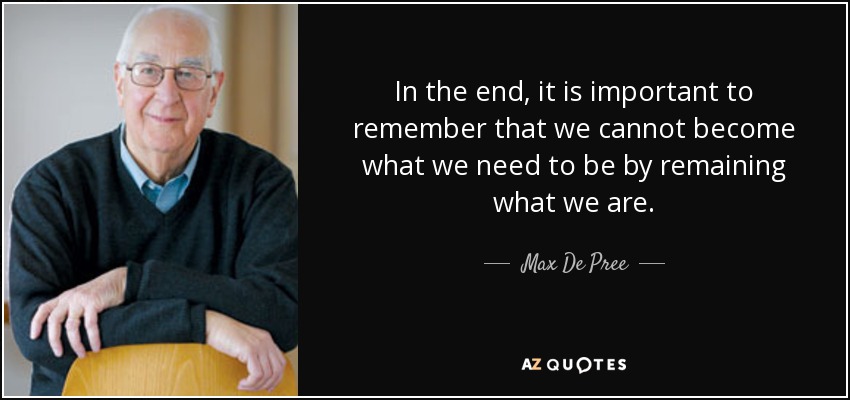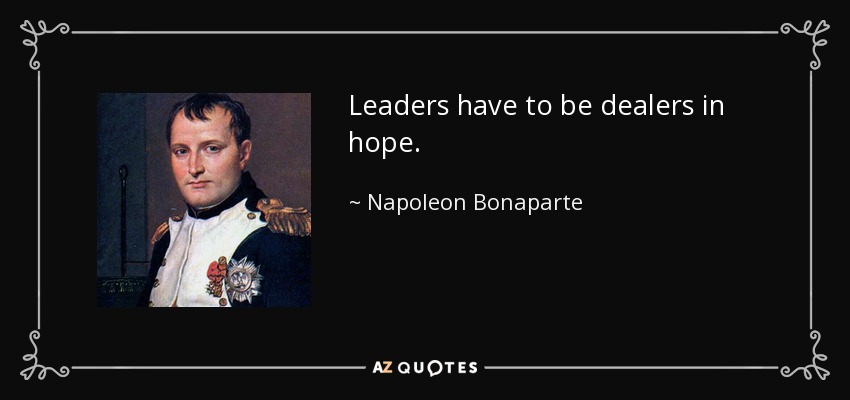Click here to return to Blog Post Intro
No matter what you do in life, it takes teamwork to make the dream work.
Here are John Maxwell’s 17 Laws of Teamwork:
1. Law of Significance: One is too small a number to achieve greatness
Maxwell asserts that nothing of significance was ever achieved by an individual acting alone. A Chinese Proverb agrees, “Behind an able man, there are always other able men.” And Andrew Carnegie pointed out, “It marks a big step in your development when you come to realize that other people can help you do a better job than you could do alone.”
2. Law of the Big Picture: The goal is more important than the role
The 1950’s Book of Football Wisdom stated, “If a team is to reach its full potential, each player must be willing to subordinate his personal goals to the good of the team.” Ray Kroc, Founder of McDonald’s, had a similar philosophy: “No one of us is more important than the rest of us.”
3. Law of the Niche: All players have a place where they add the most value
Leaders who want to help people reach their potential and maximize their effectiveness should stretch team members out of their comfort zones but never out of their gift zones.
4. Law of Mt. Everest: As the challenge escalates, the need for teamwork elevates
Tenzig Norway, a 1930’s mountain climber, said, “You do not climb a mountain like Everest by trying to race ahead on your own or competing with your comrades.” Maxwell points out that one mistake people make is they focus too much on their dream and too little on their team. If you build the right team, the dream will almost take care of itself.
5. Law of the Chain: Strength of the team is impacted by its weakest link
Maxwell notes that one of the mistakes he made early in his career as a leader was that he thought everyone who was on his team should remain on the team. He would later learn that for weak links, you need to train or trade them. Somebody who is a weak link on your team might be capable of becoming a star on another team.
If you need to remove somebody from the team, be discreet, clear, honest, and brief. Then, once the person is gone, be open about it with the rest of the team while maintaining respect for the person you let go.
6. Law of the Catalyst: Winning Teams have players who make things happen
Catalysts brings intensity—stirring things up, making things happen, and generally doing whatever it takes to push the team to the next level. Truett Cathy, founder of Chick-Fil-A, liked to say, “If it’s to be, it’s up to me.”
7. Law of the Compass: Vision gives team members direction and confidence

A compelling vision builds on the past (it doesn’t diminish it). Jack Welch of GE argued, “Without question, communicating the vision, and the atmosphere around the vision, has been, and is continuing to be, by far, the toughest job we face.”
8. Law of the Bad Apple: Rotten attitudes ruin a team
Our Attitude is the librarian of our past, speaker of our present, and prophet of our future. President Thomas Jefferson pointed out, “Nothing can stop the man with the right mental attitude from achieving his goal; nothing on earth can help the man with the wrong mental attitude.”
Bill Russell—centerpiece of the Boston Celtics’ NBA dynasty that won eleven NBA championships during his thirteen-year career—explained, “The most important measure of how good a game I played was how much better I’d made my teammates play.”
9. Law of Countability: Teammates must be able to count on each other when it counts
Trust is the foundation of all interaction with people. Navy SEAL John Roat said, “Unit cohesion is one of those terms that everyone thinks they understand. In truth, most people don’t have a clue. You have a pride in the ability of your group to function at a higher level than possible for the individual. The unit doesn’t shine because you’re a member, you shine because you’re good enough to be a member.”
10. Law of the Price Tag: Team fails to reach its potential when it fails to pay the price
If a team doesn’t reach its potential, seldom is ability or resources the issue. It’s always a payment issue – those teams prove unwilling to take risks and break new ground. Like President Eisenhower said, “There are no victories at bargain prices.”
11. Law of the Scoreboard: Team can make adjustments when it knows where it stands
If a team is to accomplish its goals, it has to know where it stands. Your game plan tells you what you want to happen—the scoreboard tells what is happening.
12. Law of the Bench: Great teams have great depth
When the Army is in trouble, it calls up the reserves—that’s the way it is in every area of life. Leader, if you are not already mentoring a teammate on the bench, start doing so today.
If you can sustain growth in the midst of success and repeat the process while continually building your bench, then you can create a legacy team (like those at GE, Disney, and Home Depot).
13. Law of Identity: Shared values define the team
Ken Blanchard notes that “Lots of companies claim they have a set of core values, but what they mean is a list of generic business beliefs that everyone would agree with (having integrity, making a profit, responding to customers). Such values have meaning only when they are further defined in terms of how people actually behave and are rank-ordered to reveal priority.”
Mother Teresa put it this way, “You can do what I cannot do. I can do what you cannot do. Together, we can do great things.”
14. Law of Communication: Interaction fuels action
Communication increases commitment & connection, which fuels action in an organization. In your communications, you need to be consistent, clear, and courteous.
Basketball Star Earvin (Magic) Johnson paraphrased President John F. Kennedy when he said, “Ask not what your teammates can do for you. Ask what you can do for your teammates.”
When leaders don’t listen, they stop gaining wisdom and hearing what isn’t being said. Team members stop communicating, and indifference spreads across the organization…
15. Law of the Edge: Difference between two equally talented teams is leadership
- Personnel determine the potential of the team;
- Vision determines the direction of the team;
- Work ethic determines the preparation of the team; and
- Leadership determines the success of the team.
Leadership is about understanding your players and getting them to work together to reach their potential. Good leaders are lifters, who elevate others’ performance.
16. Law of High Morale: When you’re winning, nothing hurts
High morale gives a team energy, and problems seem to disappear. To change your organization culture or your team’s attitude, you need to act your way into feeling—not feel your way into acting.
17. Law of Dividends: Investing in the team compounds over time
Someone pointed out that the secret of Morgan Wooten—the winningest High School basketball coach in U.S. history—was that he makes whomever he is with feel like the most important person in the world.
Deciding that people on the team are worth developing is the first step in building a better team. One of the most essential tasks is to clear obstacles so the team has the best possible chance to work towards success. (This is similar advice to Shepherd Leadership’s “Remove the Irritants”).
Where there’s a will, there’s a way; where there’s a team, there’s more than one way.
Today, commit to set aside time and money to invest in your team. And take personal responsibility for growing your core leaders. Chemistry isn’t something you can create with one skill or technique. It develops when you are able to implement all of the Laws of Teamwork.
May the 17 Indisputable Laws of Teamwork grant you success, as you shoot for the stars!



